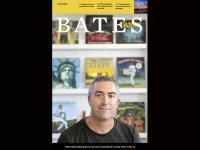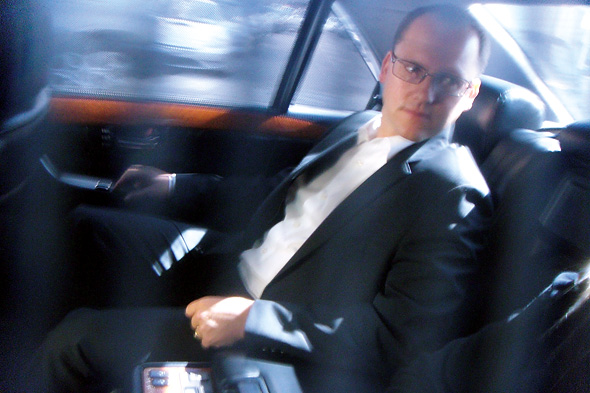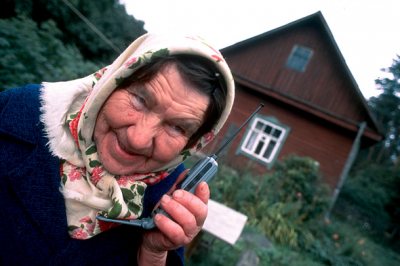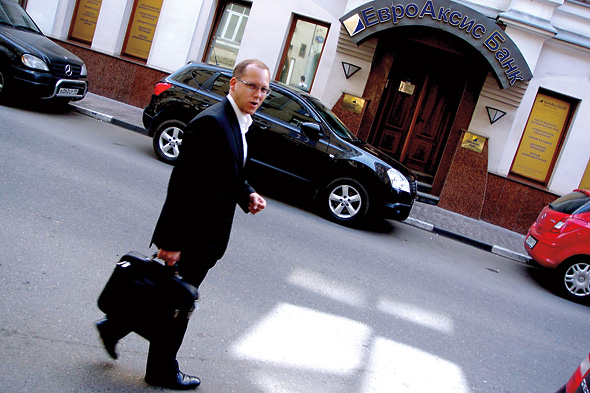
Our Man in Moscow
You can still make money doing business in Russia, says Jere Calmes ’92, just not in the same wild ways
By Peter van Dyk
Photographs by Erin Calmes-Keta
When a capitalist country was born out of the remnants of the Soviet Union two decades ago, many adventurous young Westerners found an unlikely land of opportunity. One of them was Jere Calmes ’92 — and he has now spent most of his working life in Russia. It is still, he says, a land of opportunity, even if the opportunities have changed.
In well-appointed offices behind the unobtrusive front door of a renovated period building less than a mile from the Kremlin, Calmes says Russia’s healthcare sector is ripe for investors to make money, and he’s putting together a private equity fund to do just that. It’s a far cry from what he found in Moscow a few months after graduating from Bates in 1992 with a political science major and a secondary concentration in Russian.
“It was a crazy time when you could do almost anything you wanted to,” he recalls. “Everybody was doing anything. You didn’t need money. You just needed an idea.”
For him, the idea was cell phones. About six months after arriving in Moscow to teach introductory macroeconomics in English at a university, he helped launch VimpelCom. He was the 11th employee.
“We didn’t have money,” Calmes says. “We rented an office from the Moscow News for barter of two telephones.” VimpelCom became the first Russian company to be listed on the New York Stock Exchange and is now worth around $19 billion.
Much of that value is built on the Beeline cell-phone network. Calmes was VimpelCom’s first marketing manager, and he is fiercely proud of the success of the Beeline brand, considered one of the most valuable brands in the world.
“We hired a guy that I met at a party drinking vodka one night, and we did the entire Beeline branding for less than $5,000,” he says, explaining: “He was really dying to have the job.”
Starting with just 13 base stations, the company quickly made money. And in Russia in the early 1990s, that attracted attention.
“Things were pretty chaotic here, and we ran into some issues, like everybody doing business in Russia, and then I left the country in 1994 kind of in a quick way, to make sure that everybody would be OK.”
Calmes gives a little laugh, suggesting he’s understating things a little, but he won’t be drawn out further. “Without going into details, we had some problems. Those problems were resolved over time and VimpelCom continued to flourish.”
If Calmes seems, well, calm in the face of what some might consider professional catastrophe, it’s a trait he carried with him from Park City, Utah, to Bates back in 1988. In high school he was a daring hot-shot alpine skier hoping to move up the U.S. Ski Team development ladder. But he just wasn’t fast enough, so he headed to Bates, obeying the rule among young skiers: “Ski slow, off to college you go.”
At Bates, Calmes skied four years and captained the team his senior year. He also took Russian courses and studied in St. Petersburg in the fall of his junior year. He once said that his father gave him one piece of advice for college: Learn to speak Russian or Chinese. Calmes’ choice of Russian reflected his priorities at the time: Afternoon Chinese classes conflicted with ski practice, so he opted for the morning Russian classes.
If no longer a hot-shot, Calmes is still daring. He left Russia in 1994 and joined Motorola, working in London, Egypt, and Russia. Then, in 2001, with VimpelCom struggling as Russia started to boom under the presidency of Vladimir Putin, Calmes returned to the company.
Calmes remembers the original business plan envisaging 10,000 subscribers within 10 years. When he became vice president for operations in 2001 the company was adding 30,000 subscribers a month. And that was small potatoes. Less than five years after the millionth customer signed up, there were 45 million Beeline numbers in operation.
Despite the potential for profits, Western confidence in the Russian business environment has taken hits over the past decade. The biggest blow was probably the 2003 arrest, conviction, and imprisonment of billionaire Mikhail Khodorkovsky, founder of the Russian petroleum company Yukos, on fraud charges.
Khodorkovsky’s supporters have long said that the case against him is political, arguing that Putin wanted to punish Khodorkovsky for funding opposition groups. The Kremlin maintains that the judiciary is independent and says it has no influence over the cases involving Khodorkovsky or anyone else.
But in the years following the Yukos case, government or judicial involvement in business disputes, especially those involving foreign entities, routinely seemed to favor the Kremlin’s side.
A prime example was Calmes’ own company, VimpelCom. In the 2000s, a well-chronicled dispute between the company’s two main shareholders, Norwegian telecom Telenor and a Russian conglomerate owned by tycoon Mikhail Fridman, spilled into the Russian courts. Sure enough, the courts ruled against Telenor in decisions deemed “dubious” and “bizarre” by the Western media.
The feud didn’t end until 2009, and then only because the Russian government, in reaching out to the private sector, was seen as trying to “remove a stain from Russia’s troublesome record with foreign companies,” in the words of The New York Times.
Calmes says the Telenor dispute, and in particular the way the courts were misused, undoubtedly shook Western confidence in the security of private investments in Russia. He laments that some people have the ability “to use a legal system in Russia that is not entirely functional, that can be exploited.”
“Quite frankly, the courts weren’t used — meetings at cemeteries and guns were used.”
“In my world, [issues around the judiciary’s functionality] started when Khodorkovsky went to jail,” he says. “That was the watershed event.”
A day after Khodorkovsky’s jailing, so-called price lists — specific bribe amounts needed to influence the court case — were available to lawyers on the streets of Moscow. “Russia’s got a very strong executive branch with nothing else. So the checks and balances of the legal system pretty much aren’t there.”
On the other hand, Calmes says that it is a sign of progress that business disputes turn to the Russian courts. “Back when everybody was running by the seat of their pants, there wasn’t time for the courts, and quite frankly, the courts weren’t used — meetings at cemeteries and guns were used. The good thing about what we saw was the courts were used.”
Calmes says you have to factor the judicial doubts into the go/no-go of every business decision. “Can your rights be enforced? It’s always something to be asked. Are you going to buy a factory if getting control means going through the courts? No, absolutely not,” he says.
“And I think one of the biggest problems that Russia has today for going forward is this lack of a functioning judicial system.”
Calmes and his family — a Russian wife and three children — left again in 2006, this time for Italy and with no drama. (In Italy, he worked for the mobile group Wind, which was recently bought by VimpelCom to create the fifth-largest global operator by subscriber count.)
Calmes brought his family back to Russia within two years to take up the new challenge of the healthcare sector, first as CEO of a chain of pharmacies called 36.6, and now with the private equity fund. He is also a member of the board of directors of Tele2, a European telecommunications company with 24 million customers in 11 countries.
“There’s a certain bit of surprise that after all this time I’m still here, but I’ve changed my concept of how the world works. I don’t consider my home is Russia — I consider Russia as one of my bases, America is another,” he says. “If someone asked me where I was going to retire, I don’t know, but I hope it’s in America, probably somewhere in the Swiss Alps, and in Russia.”
But he’s a long way from retiring yet — he says there are too many opportunities to make money in Russia.
“You’ve got this dynamic country that continues to grow, and you still have a bunch of sectors that are underdeveloped, underinvested, fragmented, and it just makes a wonderful field for playing business. And that’s what I’m doing right now.”
Peter van Dyk is a Moscow-based journalist who regularly reports for National Public Radio.









